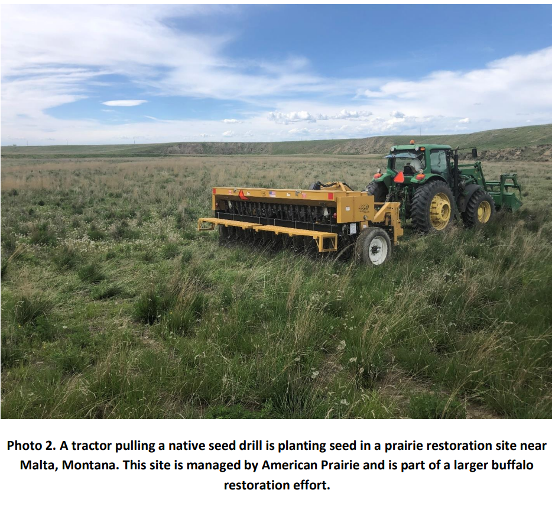The Pollinator Friendly Places Initiative
Since September 2021, Pollinator Partnership (P2) has collaborated with Toyota Motor North America (TMNA) to launch the Pollinator Friendly Places initiative. Through this program, P2 and TMNA are working together to create, enhance and protect thousands of acres of habitat for pollinators, increase landowner education, increase the implementation of best management practices, provide education and volunteer opportunities to Toyota staff and the public, and ultimately support the health of pollinators across North America.
For each project that P2 supports with funding from TMNA, native plant species are carefully selected to ensure they are well-suited to the local environment. This approach provides several benefits, such as increased resilience to difficult growing conditions, lower water requirements, and deep root systems that help keep soil in place.
Choosing native plants also has the benefit of providing a home to native pollinators and other beneficial insects, many of which have developed close associations with native plants. In some cases, a certain plant species or genus will be the only type of plant that is eaten by a species of insect. These plants, known as host plants, are vital parts of pollinator habitat and are featured in the species distributed to plant awardees.
In the very first year of the initiative, P2 received reports of numerous imperiled species, including pollinators and other wildlife, being observed nesting in, foraging in, or otherwise using the sites that this program has supported. Those species include monarch butterflies, eastern box turtles, rusty-patched bumble bees, Karner blue butterfly, American bumble bee, American woodcock, northern bobwhite quail, northern harrier, and sandhill crane.
As of the end of fiscal year 2024, P2 has helped enhance 10,253.1 acres across the United States, Canada, and Mexico. Check out P2’s map to see where they are working to improve habitat and create a better future for pollinators.

| Pollinator Partnership’s Friendly Places Initiative* | P2 is distributing native wildflower seeds to qualified applicants across North America to plant in prairies, meadows, gardens or other habitats that already have flowering vegetation. Recipients of the seeds include private landowners, nonprofits and local, state and federal government agencies. |
| Regions | FY2024 Project Summaries |
U.S. |
In FY2024, P2 awarded native plant material grants to 51 habitat projects across 21 states. Among those awarded were Saint Regis Mohawk Tribe Agriculture Program Tribal Farm, a non-profit working to restore a large continuous area of buffalo habitat; Remy Wines, a family-owned vineyard in Oregon; the Palouse Conservation District; and the Miami-Dade County Environmentally Endangered Lands Program. In addition to the seed grants awarded to the public, P2 provided plant material support in two other forms: as habitat grants to farmers and as seed to the Partners for Fish and Wildlife program. P2 contacted farmers in California and one in Minnesota through the Bee Friendly Farming program. P2 also supported two prescribed burning operations during this grant cycle. This represents a new approach within this project, as funds had not been previously allocated for burning. Relatively frequent, low-intensity fires help maintain and create pollinator habitat by removing invasive species, keeping an open canopy for wildflowers to grow, and signaling the seeds of some species to germinate. These projects enhanced 2,162.3 acres of pollinator habitat. |
Canada |
P2 supported 20 on-the-ground habitat restoration projects through a seed and/or plant grant. To reach the larger habitat planting projects, which were in Ontario, British Columbia, Saskatchewan, Nova Scotia, Quebec, and Alberta, P2 worked with the BeeCity Canada program, which is managed by Pollinator Partnership Canada, and P2 staff, to locate eligible projects who were then invited to apply for seed/plants. Award sites included four municipalities, three government agencies, one indigenous-led farm, six schools/universities, five community organizations, and the Calgary Zoo. These projects enhanced 69 acres of pollinator habitat. |
| Mexico | See the story about P2’s partnership with WWF on Restoring Forests in the Monarch Butterfly Biosphere Reserve. This project enhanced 5,587.1 acres of pollinator habitat. P2 provided funds to Hector Avila, owner of Cosmos Semillas Nativas, a native wildflower nursery in central Mexico. There has historically been very little native seed commercially available in this region, but TMNA funding has expanded Hector’s seed nursery operation, including the installation of irrigation, the identification of potential project partners, and the harvest, cleaning, and storage of the seed. Hector also produced a user-friendly manual on creating wildflower habitat that is being distributed to partners throughout Mexico. Although the total acreage of the Cosmos operation is currently small (0.2 acres counted toward FY2024), this project represents an important step in amplifying the supply of native seed in Mexico. By supporting this project, we expect to see increases in acreage of pollinator habitat in this part of Mexico in the coming years. |
* The P2 partners and projects listed above are funded through TMNA’s grant to P2.
Gemperle Orchards
Read more about P2’s grant to Gemperle Orchards in California.



